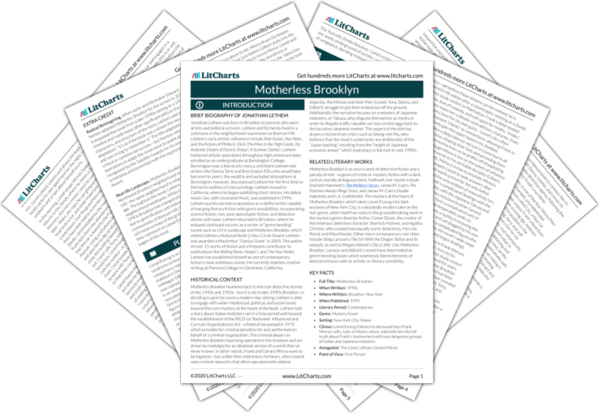Mystery and the Futility of Answers
Jonathan Lethem’s Motherless Brooklyn is a novel-length parody of—and love letter to—the noir genre: a kind of detective novel marked by dark cynicism or even misanthropy. As Lethem creates a twisting, labyrinthine mystery and follows Lionel Essrog, the unlikely, Tourette’s-afflicted detective who seeks to solve it, he both highlights the ridiculous self-seriousness of noir and points to the larger failures of the entire mystery and detective genre. Ultimately, Lethem argues that the practical answers…
read analysis of Mystery and the Futility of AnswersDifference and Otherness
Lionel Essrog, the protagonist of Motherless Brooklyn, suffers from severe Tourette’s syndrome: a neurological disorder marked by repetitive, uncontrollable physical or vocal tics. Lionel also displays obsessive-compulsive tendencies: as he makes his way through the world, he feels compelled to tap his surroundings; to kiss and lick objects and people; and to engage in endless, riffing wordplay which is often obscene in nature. Lionel, an orphan, has been told all his life by…
read analysis of Difference and OthernessMasculinity, Father Figures, and Mentorship
Though Lionel Essrog is a member of “Motherless Brooklyn”—the nickname that Frank Minna’s brother Gerard gives to the group of orphans whom Frank takes under his wing during their youth—as the novel unfolds, Lethem focuses more on what it means to be fatherless than what it means to be motherless. Without any concept of a “father” apart from Frank, Lionel and his fellow Minna Men—Tony, Danny, and Gilbert—strive to figure…
read analysis of Masculinity, Father Figures, and Mentorship
Language, Communication, and Understanding
Lionel Essrog, the protagonist of Motherless Brooklyn, suffers from Tourette’s syndrome—and his endless verbal tics and echolalia (repetitions of others’ spoken words) often take the form of wordplay, puns, and a steady stream of seemingly unassociated verbalizations. Through Lionel, Lethem explores the ways in which language shapes one’s understanding of the world—and the ways in which it can further one’s sense of isolation and unknowability. Lionel’s struggle to be heard, seen, and known…
read analysis of Language, Communication, and Understanding






